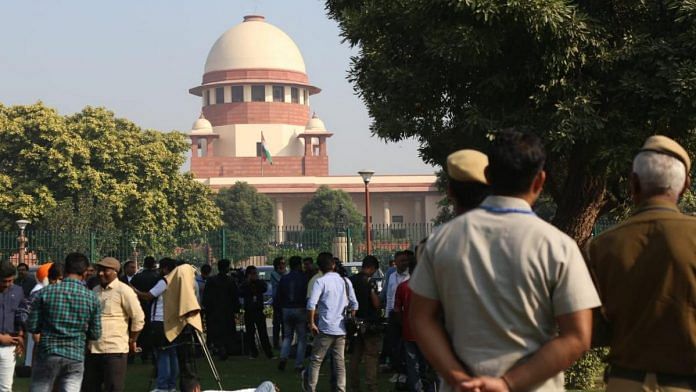New Delhi: Daily orders and judgments of the Supreme Court will soon be translated into nine vernacular languages with the help of artificial intelligence (AI) tools developed in-house to reduce human intervention in translating judicial documents.
Senior officials in the Supreme Court registry told ThePrint the AI tools are being tested to achieve at least 90 per cent accuracy in translation. A committee headed by Justice L.N. Rao is supervising the project.
The vernacular languages in which the order and judgments will be available are Marathi, Hindi, Kannada, Tamil, Telugu, Punjabi, Gujarati, Malayalam and Bengali.
While the translated judgments will be uploaded on the Supreme Court’s official website, daily orders of court proceedings will be provided to litigants and lawyers who request for it.
Use of AI tools for its translation work takes the Supreme Court a step forward in its project to provide translated copies of judgments. Launched last July, the top court had started posting judgments in six regional languages — Assamese, Hindi, Kannada, Marathi, Odia and Telugu. While translation was done manually under this exercise, it wasn’t meant for daily orders. In some instances, the Supreme Court took help from state high courts to translate its judgments.
Also read: This is why the Supreme Court should take some blame for India’s economic crisis
Translated judgments won’t come with disclaimer
The court intends to ensure that translated judgments still adhere to the spirit of the original order.
“At present tools are being tested to ensure we achieve more than 90 per cent accuracy. For the remaining 10 per cent, we would need human intervention. The tools will not eliminate manual involvement, but will reduce it to minimal requirement,” a registry official explained.
He said the top court does not want to upload any judgment or provide an order in a language, other than English, with a disclaimer.
“We want it to be authentic before it is made public,” he said.
The idea of delivering daily orders in vernacular languages is a step to facilitate access to justice for litigants and also reduce their dependence on lawyers to know what transpired in their cases before the court.
“There are thousands of non-English speaking litigants who approach SC for dispute resolution. For them, it becomes difficult to keep a track of cases when orders are written in English. Translated versions will give such litigants a clarity on the proceedings of their case,” the officer said, adding, “On seeing the success of AI, we shall gradually increase the vernacular languages in which judgments can be translated.”
Also read: Loving freely, right to privacy, NOTA, Ram Mandir — 10 historic SC judgments of the decade
AI tools to make judicial process faster
The need to develop AI tools for translation arose when registry officials realised that hearings in criminal appeals filed in the Supreme Court, through legal aid services that provide free assistance to the poor, were getting delayed for want of translated documents, registry officials said.
“Normally, in criminal appeals, documents, such as FIR, police chargesheet and also court judgments, are in vernacular language. In such cases, appeals are not listed for hearing till these documents are translated in English,” the officer said.
Legal services authorities usually hire the services of an external translator for the task. With AI tools, the work can be done in-house.
The top court has shared the tools with 15 high courts for testing, advising them to use it as well.
Also read: Judiciary has left citizens to fend for themselves, says Supreme Court lawyer Dushyant Dave




If the translation of documents is getting delayed, wouldn´t it make more sense to hire more professional translators who can translate based on cultural-linguistic differences and overall context, which AI cannot? Or perhaps the Supreme Court is ready to use AI to write at least 90% of its judicial decisions and have the judges intervene for the remaining 10% to alleviate the backlog of cases?